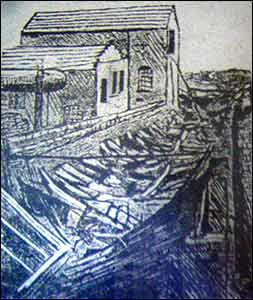|
|||
| The Rushden Echo, 10th July 1908, transcribed by Jim Hollis |
|||
|
Brick and Tile Co.’s Drying Plant Burnt Out
|
|||
|
Serious Fire at Rushden - Lightning Causes Much Damage |
|||
|
|
|||
|
A terrific thunderstorm burst over Rushden and district on Friday night, and in the midst of the storm a fire broke out on the premises of the Rushden Brick and Tile Company, Wellingborough-road, Rushden, and did damage amounting to many hundreds of pounds. The lightning was extraordinarily vivid, and the peals of thunder were very heavy. Many people were watching the lightning, and the outbreak of fire was consequently observed practically as soon as it occurred. Several people in the Wellingborough-road district noticed one particular vivid flash and immediately afterwards flames were seen issuing from the great wooden shaft at the end of the drying sheds at the brick works. The works, being situated in open ground near the railway, are visible to a considerable distance on all sides, and many spectators were soon attracted to the scene.
P.C. Knight and P.C. Webster were on duty in the Wellingborough-road district, and quickly raised an alarm. Inspector Cameron and P.S. Ellingham, with other police officers, were speedily on the scene, and with several willing helpers did what they could to stay the Progress Of The Flames while preserving order. It was evident from the outset that no portion of the wooden shaft of the drying shed could be saved, the whole of it being a mass of flame within a minute or two of the outbreak. It was not long before the shaft fell in and the fire spread to the wooden gangway leading from the pits to the grinding room. This gangway was a massive structure of wood and iron, but the flames, fanned by a strong wind, soon destroyed it, though some of the hanging beams smouldered for some hours. The drying shed, a structure of brick and iron 68 yards long, contained a considerable quantity of wood, barrows, etc., also caught fire at the end where the wooden shaft was and the whole of it was eventually destroyed. The heat from this shed was intense and the corrugated iron roof was soon red-hot. All the woodwork was as dry as tinder owing to the recent hot weather, and burnt with the greatest rapidity. The Rushden Fire Brigade
Prevent the Spread of the fire. Their efforts in this direction, seconded by a few of the spectators and the police, were successful to a great extent, the conflagration being prevented from extending to the machinery buildings and the engine-house. The wind, fortunately, aided them by blowing away from the buildings, or nothing could have prevented the total destruction of the works. As it was, great watchfulness had to be observed and the firemen, although obstructed by volumes of smoke, had to cut away the end of the blazing gangway leading into the machinery buildings. By about 1.30 a.m. all danger of flames spreading to the chief buildings was practically at an end. The brigade, therefore, returned to the station with the engine, leaving one or two of their number to watch the buildings till later in the morning. So bright was the light from the flames that the vivid flashes of lightning which prevailed right through the conflagration were hardly noticed. |
|||
|
|
|||
